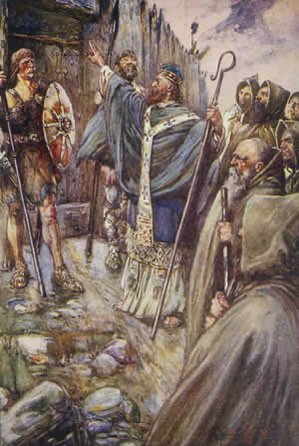Friday Links
St. Columba, patron saint of poets
June 9, 2023
Dr. Kelly Scott Franklin: Why was “Joan of Arc” Mark Twain’s favorite among all his many books?
Aarik Danielsen in Fathom: Breaking Big
Jessica Hooten Wilson in Church Life Journal: The End of Reading
Aaron Weinacht reviews Eugene Vodolazkin’s A History of the Island
Bonus content: B.D. McClay’s Notebook on Substack, JMW on Zena Hitz’s new book, Create a master study in oils of Zurbarán’s St. Francis at Prayer with Gwyneth Thompson-Briggs
Dr. Kelly Scott Franklin: Why was “Joan of Arc” Mark Twain’s favorite among all his many books?
This is a reprint of Dr. Kelly Scott Franklin’s excellent review of Mark Twain’s Personal Reflections of Joan of Arc. Here’s a taste:
But Joan’s life reveals her natural gifts as well, and Twain cherishes those qualities in her. He depicts her amazing leadership, especially her ability to transform fallen men into heroes. To one of her childhood companions, a boastful coward known mockingly as “the Paladin,” she says calmly, “Of old you were a fantastic talker, but there is a man in you, and I will bring it out. . . Will you follow where I lead?” As the narrator, based on Joan’s page and secretary Louis de Contes, puts it: the Maid was “supremely great in the gift of firing the hearts of hopeless men with noble enthusiasms, the gift of turning hares into heroes, slaves and skulkers into battalions that march to death with songs upon their lips.” In this way, Joan looks upon men with God’s eyes. Seeing the greatness to which each man is called, she reaches out her hand and challenges him to stand up. We could all use a little Joan of Arc in our lives.
Aarik Danielsen in Fathom: Breaking Big
This essay is lovely. “I want to rest my faith not on the obvious miracles, but upon the proposition that every day yields ten thousand little glories,”writes Danielsen.
Jessica Hooten Wilson in Church Life Journal: The End of Reading
In this excerpt from her book, Reading for the Love of God, JHW reminds us, “The end of all our reading should be contemplation. Our active life, fostered by tropological reading, will be frenetic, fruitless, and unsatisfying without contemplation, which is the way of knowing the Maker of all meaning.” Read the whole thing!
Aaron Weinacht reviews Eugene Vodolazkin’s A History of the Island
Vodolazkin’s newest novel unapologetically suggests that we should do exactly that. Although my inner Thomas Paine bows to no one in its visceral tendency to reject authority, Vodolazkin reminds me of the shortsighted-ness of that view and—keeping in mind the Catholic principle of subsidiarity—suggests how much better it is to strive instead for better kings and better priests. A faint hope? Possibly. But at least in Vodolazkin, we have the third archetypal vision of legitimate authority to accompany our longed for priest and king: the prophet.
B.D. McClay’s Notebook on Substack, JMW on A Philosopher Looks at the Religious Life by Zena Hitz, Create a master study in oils of Zurbarán’s St. Francis at Prayer with Gwyneth Thompson-Briggs
Here’s some bonus content sans comment because I have a cold. My part of the Northeast is covered in smog and smoke imported from Canada. Do not recommend. Not as good as the bacon. Please blame any typos or mistakes on wind patterns. And pray for all of those who are suffering due to these fires.


